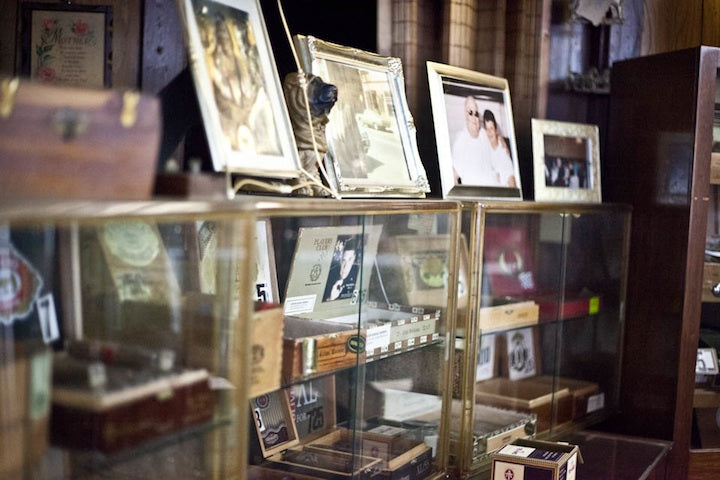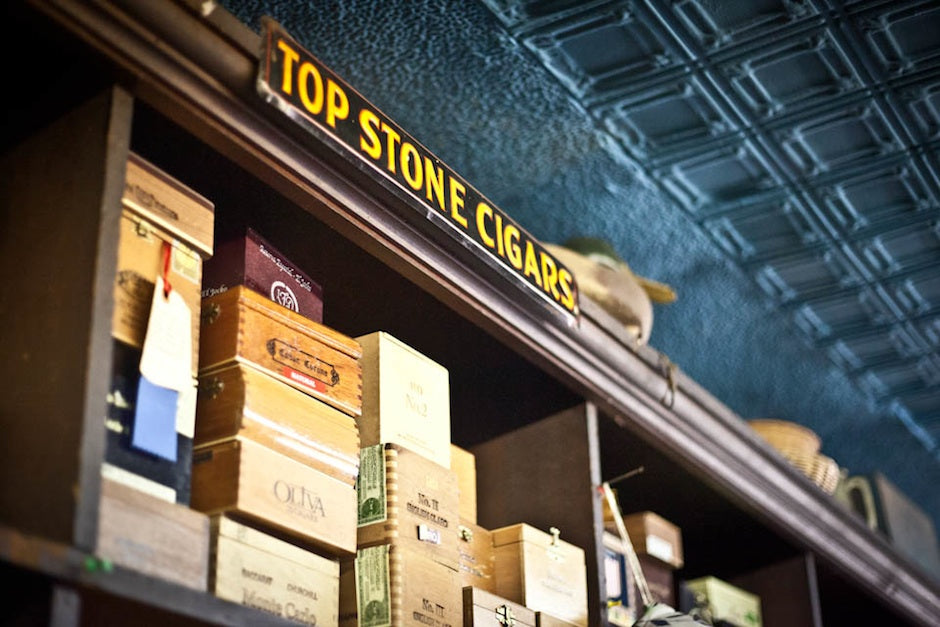F ran Squillo Vessichio is the “mayor” of State Street. Ask anyone. Or at least, ask any member of the daily and seemingly unending stream of friends, neighbors and passersby visiting her shop on State Street. Located between Bishop and Edwards, next to the Mexican burrito spot C.O. Jones, Squillo Smoke Shop has been in her family since 1930.
“Retire?” she says incredulously. “I’ll quit when I drop dead.” That’s the characteristic straightforwardness, tempered with deep kindness and a palpable sense of history Fran has successfully maintained in the shop. To step into Squillo is to step back to a heyday of sorts when people celebrated cigars, their legacy and the surrounding culture of connoisseurship. “That was just a different era. People were smoking cigars regularly back then.”
Squillo is a small shop, its walls lined with shelves of boxes and tins and individual cigars. It smells of cigar tobacco, of course, but also of spice and deep pine wood. The checkered tin ceiling is painted the color of deep ocean. Fran’s great-uncle started the place in 1930 and passed it down to her father, Angelo Squillo. In its first iteration, the store was on Wallace Street off Grand Avenue, but it’s been on State Street for 52 years now. And so has Fran—she’s been a Squillo employee since she turned 17. Even through college, nursing school and as a nurse in the emergency room at the Hospital of St. Raphael, she found time to help her father and uncle at the store. “It’s a family business. It was always ours.”
Squillo (the store and its owner) is tucked under an imposing neon sign reading “Te Amo Imported Cigars” with the block letters of the Squillo Distributing Co. sign just to
Squillo Smoke Shop and Distributing Co.
965 State St, New Haven (map)
Mon-Fri 10am-5pm, Sat 10am-3pm
(203) 865-0074
the right. It’s a little quieter now, the store, less customers than back in the day, but individuals trickle in slowly on a warm, weekday afternoon. And visitors. Oh, the visitors. They may not be there to buy anything, but Fran holds court all day with friends, family, neighbors. In the span of an hour’s interview, four people (and one dog) stop in, just for a chat. They’re offered water, a beer, a snack. Conversation. John Panza, a chef at J.P. Dempsey’s across the street, storms in and takes a seat, still aproned. “Fran’s like the matriarch of the street. People are always coming in to see her,” he grins. “Like me.”
Fran’s oldest customer is 99 years old. Cigar lovers are still loyal, she says, despite the recession, but they buy less. “Don’t ask me how I survived, but I did.” It’s just her running the shop, no help, open every day but Sunday.
As for the cigars, Fran’s got plenty in stock. She favors—of course—Squillo Brand Cigars. Italian style, a hard cigar, no humidification necessary. They’re made in Pennsylvania now, she says, but they used to be made in Long Island. They’ve long since been outsourced, but still bear her name. She surprises with this fact: “Connecticut has some of the best shade-grown leaf in the world.” That’s the outer wrap of the cigar, and the most expensive cigars in the world use Connecticut leaf: Davidoff (Cuban), Macanudo (Dominican). “Connecticut Shade” wrapper leaf, grown under the shade of nylon tents, sells for as much as $45 a
sponsored by
pound.
If you want premium, she says, look for handmade, long filler cigars. That means the tobacco leaves aren’t chopped up into smaller, short pieces. They’re long throughout, making for a smoother smoke, and are nearly always a blend of tobaccos from different regions. Cubans are ever popular. “But the embargo. So Dominicans are the best you can get now—they’ve got the same climate as Cuba, similar seeds. And you know, some people say they love Cubans, and others don’t. It’s a matter of taste, honestly.” No Cubans, but Fran’s shelves are lined with Squillos. And with Moneymakers (Connecticut), Romeo and Juliets and Astons (Dominican Republic), Montereys (California) and Montecristos (Dominican). “You don’t have to spend a lot of money to find a good cigar. It can be inexpensive but burn smoothly. It depends on the leaf. And people have different tastes. You might like something I don’t.”
Squillo’s Yelp page has not a single review, and she doesn’t run a website. Her computer barely works, she says. “We used to have a website but eh, we didn’t really need it. We do business face to face here.” She likes to keep it old-fashioned, and so do her buyers. Fran is no-nonsense yet kind to customers, unobtrusive but quick with a bit of advice or guidance when asked for it. “I’m happy to help someone find what they’re looking for.”
On a Tuesday morning, a young man, probably in his late twenties, stops in to purchase a few cigars for him and his buddies. He knows the brand he wants, but seems hesitant. “Maybe I’ll get more than three. Four? There’s five left here.” He looks at her hopefully. “Do you still need the box…?” He’s holding all five wrapped cigars now, along with an empty, honey-colored light wood cigar box. It’s beautiful, with that sense of gravitas and history cigar boxes seem to have, and he clearly wants it. Fran beckons him over: “Let me see it.” She takes a look at the box, then at him. “Sure, why not. Go ahead and take it.” Grinning, he pays for his cigars and makes off with his newfound treasure. She’s made his day.
Written and photographed by Uma Ramiah.














